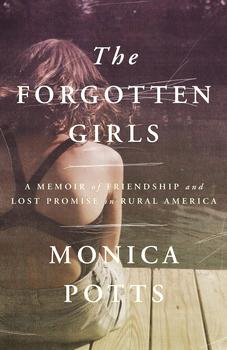Summary | Excerpt | Reviews | Beyond the book | Read-Alikes | Genres & Themes | Author Bio

A Memoir of Friendship and Lost Promise in Rural America
by Monica PottsPopulation health experts have found that the least-educated white Americans have begun dying younger. While Black Americans still have a lower life expectancy than their white counterparts, the downward drift of this segment of whites arguably indicates two class developments: First, that the education gap is growing; and second, that those who believe in a zero-sum game of racial hierarchy and therefore feel demoted by the progress of minorities are reacting against their self-interest. Interpreting the ascendency of different-looking people as lost ground, some are entrenching themselves and others in isolationist, anti-"elite" policies that wall them off from the educational opportunities and cultural diversity that could otherwise nourish their communities. The rise in mortality is affecting white women without a high school diploma especially; their average life expectancy has shortened by five years (from 78.5 to 73.5 between 1990 and 2008), while the life expectancy of men has shortened by three (from 70.5 to 67.5).
Journalist Monica Potts left a southern city whose inhabitants fit this alarming statistic. But in The Forgotten Girls: A Memoir of Friendship and Lost Promise in Rural America, she returns to catch up with her childhood best friend Darci, who stayed and ended up falling into a lot of the traps (addiction, early motherhood, spousal abuse, homelessness) that womanhood in today's impoverished, insular communities increasingly entails.
By tracing the directions she and her friend were each buffeted by small-town pressures, Potts supplements academic studies with firsthand experience of how conservatism, isolation and recession are making it harder to live. Along the way, she realizes how much of herself is still mirrored in the person she tried to forget so long ago, and how easily their roles might have been reversed. "I thought I was looking for the women most affected by these changes, the most in danger of dying," she writes. "It turned out, though, that I was looking for only one person... I realized that my investigation would turn on all the questions science couldn't answer, on what my best friend's life had been like after I'd left, and on how she'd ended up in that trailer on top of the mountain."
Potts and Darci grew up in Clinton, Arkansas, the most populous city in Van Buren County at 2,500 citizens; one of several "towns full of desperation" just below the Ozarks with an inauspicious origin. After Indigenous peoples were forced off of it, the virtually uncultivable land was settled by English, Scottish and Irish subsistence farmers who bought the United States government's promise that anything could be achieved through can-do. Potts' observation that "the flip side of American independence is a tendency to abandon people to their fates" seems like a Tocquevillian quote for the ages. Crises of drug use and increasing mortality today map to "places where, generations ago, people were set up for failure."
Clinton is a tiny community effectively ruled by its Southern Baptist church; where all the public schools are clustered on one hill beside the rodeo arena and the chicken-processing plant; where Sesame Street looks exotic because there they have neighbors and sidewalks. The town is "poor, not just in people's incomes but in the way their lack of money and experience trapped them in a tight echo chamber, allowing something untrue to become conventional wisdom."
As children, Potts and Darci shared the dream of leaving for the more promising world they envisioned while consuming bootlegs of rap music and MTV programs. Both were raised by fathers who worked blue-collar jobs and mothers who stayed home to raise them, both were "shielded from the worst parts of poverty," and both were star students. But as Darci began to dabble in partying and dating, the harsh black-and-white judgment of authority figures and her peers—one could be either a model student or a bad egg, a virgin or a whore, a teetotaler or a drunk—sent her spiraling towards destructive behaviors. The young Potts, whose heart was set on college as a way out, started to resent her friend for settling for a lesser escape: "ceasing to care… rejecting everything about Clinton, even its rules and expectations of her." In hindsight, she wonders if she's at all guilty for turning away from Darci's new life instead of intervening.
Potts got the opportunity to assess the past in 2015, when Darci, now locked into a vicious cycle of drug abuse, petty crime, recovery and codependency, reached out to her on Facebook. The journalist, who spent most of her adult life in big cities, moved back to Clinton in 2017, where she currently resides in an old house overlooking the town.
Part biography and part investigative journalism, The Forgotten Girls is dense yet very readable, balancing engaging storytelling and pathos on the one hand with enlightening social science on the other. In fewer than 300 pages, Potts imparts the facts of several complicated social ills like fundamentalist power structures, the opioid epidemic, and America's educational and racial caste systems, while also illustrating what it's like to be caught up in them through the empathetic lens of a strained but genuine friendship. It's one thing to be apprised that the Southern Baptist church generally deems women unfit to be leaders and has ramped up its control strategies in response to the women's rights movements of the late 20th century, and another to witness an intelligent teenage girl attenuate her ambition until she's living off the hospitality of fellow drug addicts in a backwoods trailer.
Though the seriousness of the book's intent means the prose is a bit dry and the focus narrow, it is as rich in human understanding as a great novel. Both author and subject seem to be treated honestly at all times, whether they are being viewed critically or compassionately. (Perhaps this honesty isn't an unqualified good, since Darci isn't aware of Potts' "diseases of despair" angle when she gives permission for her diaries and medical records to be cited.) Unfortunately, Darci's story, a story she has in common with millions, still hangs in the balance. But providing a nuanced, clear-eyed account of how so many rural Americans are regressing towards the desperate, hardscrabble existences of their ancestors is undoubtedly how to begin to do something about it.
![]() This review was originally published in The BookBrowse Review in June 2023, and has been updated for the
May 2024 edition.
Click here to go to this issue.
This review was originally published in The BookBrowse Review in June 2023, and has been updated for the
May 2024 edition.
Click here to go to this issue.

If you liked The Forgotten Girls, try these:

by Tia Levings
Published 2026
"Today it hit me when he hit me, blood shaking in my brain. Maybe there wasn't a savior coming. Maybe it was up to me to save me."

by Eric Eyre
Published 2021
From a Pulitzer Prize–winning reporter from the smallest newspaper ever to win the prize in the investigative reporting category, an urgent, riveting, and heartbreaking investigation into the corporate greed that pumped millions of pain pills into small Appalachian towns, decimating communities.
Your guide toexceptional books
BookBrowse seeks out and recommends the best in contemporary fiction and nonfiction—books that not only engage and entertain but also deepen our understanding of ourselves and the world around us.